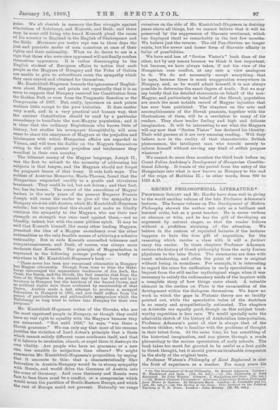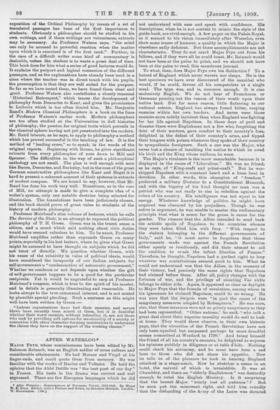RECENT PHILOSOPHICAL LITERATURE.*
PROFESSOR SORL1TT and Mr. Hardie have done well in giving to the world another volume of the late Professor Adameon's lectures. The former volume on The Development of Modern Philosophy showed the author not only as a brilliant and learned critic, but as a great teacher. He is never verbose or obscure or trite, and he has the gift of developing an argument by natural stages, so that the reader follows without a profitless straining of the attention. We believe in the custom of reprinted lectures if the lecturer happens to have the true gift of exposition, for the reasoning which carries a class with it will a fortiori carry the reader. In these chapters Professor Adamson reviews the history of Greek philosophy from the early Ionian physicists to the later Stoics. The summaries are done with exact scholarship, and often the point of view is original without losing in soundness. For example, it is interesting to regard the craze for unification in early speculations as a bequest from the still earlier mythological stage, when it was necessary to satisfy the rudimentary needs of the inquirer with a complete story of how things came about. A valuable element in the section on Plato is the examination of the development within the dialogues themselves. We know no work in which the gaps in Platonic theory are so lucidly pointed out, while the speculative value of the doctrines is so sanely and sympathetically estimated. The chapters on Aristotle are equally good, though on this subject trust- worthy exposition is less rare. We would specially note the admirable sketch of the history of Aristotelian interpretation. Professor Adanason's point of view is always that of the modern thinker, who is familiar with the problems of thought in their latest form. At the same time, he has something of the historical imagination, and can pierce through a crude phraseology to the serious speculation of early schools. The book takes too much for granted to be useful as a first guide to Greek thought, but it should prove an invaluable companion in the study of the original texts.
Professor Watson's Philosophy of Kant Explained is also the fruit of experience as a teacher. For many years his • (1) The Development of Greek Philosophy. By Robert Adamson. London, W. Blackwood and Sons. [10s. 13:1. uot.]—(9) The Philosophy of Kant Bxplained. By John Watson. Glasgow : J. Machehose and Sons. [10s. net.] —(9) Modem. Classical Philosophers: Selections Illustrating Modern Philosophy from .Bruno to Spencer. By Benjamin Rand. London : A. Constable and Co. [10s. Oil. net.]—(4) The Service of the State: Pour Lectures on the Political Teaching of T. IL Green. London : John Murray. [Ss. (kl. net.]
exposition of the Critical Philosophy by means of a set of translated passages has been of the first importance to students. Obviously a philosopher should be studied in his own writings, and if these writings are voluminous, extracts may be necessary. As Professor Watson says, "the mind can only be aroused to powerful reaction when the matter upon which it is exercised is of the first rank." Further, in the ease of a difficult writer some kind of commentary is desirable, unless the student is to waste a great deal of time. This Look does for him what a series of good lectures would do. It explains the purport and logical connexion of the different paesages, and as the explanations have already been used in a glass where the teacher was in direct touch with his pupils, the presumption is that they are well suited for the purpose. So far as we have tested them, we have found them clear and good. Professor Watson also contributes a closely reasoned 'Historical Retrospect," which traces the development of philosophy from Descartes to Kant, and gives the prominence to Leibnitz which is too often denied him. Mr. Benjamin Rand's Modern Classical Philosophers is a book on the lines of Professor Watson's earlier work. Modern philosophers are too often studied at the Universities in dull histories of philosophy, the passion for original texts which prevails in the classical sphere having not yet penetrated into the modern. Mr. Rand labours, as he says, to apply to philosophy a method which has proved successful in the teaching of law. It is the method of "leading cases," so to speak, in the words of the original reports. Beginning with Bruno, he gives significant extracts from every philosopher of note down to Mill and Spencer. The difficulties in the way of such a philosophical anthology are nob small. The plan is well enough with men Like Bacon, Descartes, and Berkeley, but in the case of the great German constructive philosophers like Kant and Hegel it is bard to present a coherent account of their systems in extracts of modest compass. We are bound to say, however, that Mr.
Rand has done his work very well. Sometimes, as in the case of Mill, no attempt is made to give a complete idea of a writer's system, only one notable doctrine being selected for illustration. The translations have been judiciously chosen, and the book should prove of great value to students of the history of modern philosophy.
• Professor Muirhead's slim volume of lectures, which he calls The Service of the State, is an attempt to expound the political philosophy of T. H. Green. Green was in the truest sense a citizen, and a creed which said nothing about civic duties would have seemed valueless to him. To be exact, Professor Muirhead amplifies rather than expounds Green on many points, especially in his last lecture, where be gives what Green might be assumed to have thought on subjects which he did not treat of directly. We question whether Green, with his sense of the relativity in value of political ideals, would have considered the incapacity of our Indian subjects for self-government a "condemnation of autocratic government."
Whether we condemn or not depends upon whether the gift of self-government happens to be a good for the particular recipients, Yet it would be ungrateful to carp at Professor Muirbead's exegesis, which is true to the spirit of his master, and in details is generally illuminating and reasonable. He looks always to the true communal interest, and is not misled by plausible special pleading. Such a sentences as this might well have been written by Green :— "Labour organisations have had their enemies, and severe blows have recently been aimed at them, but it is doubtful whether their worst enemies, without intending it, are not those who seek by providing soft options for membership of a society or connexion with other character-forming institutions to undermiue the claims they have on the support of the working classes."





































 Previous page
Previous page